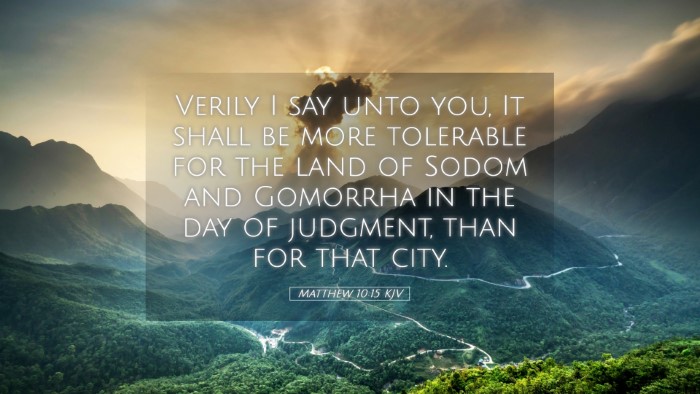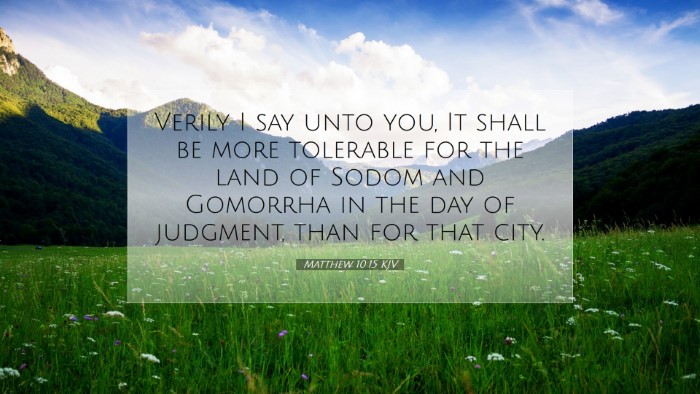Commentary on Matthew 10:15
Matthew 10:15 states, "Verily I say unto you, It shall be more tolerable for the land of Sodom and Gomorrah in the day of judgment, than for that city."
Contextual Overview
This verse is part of the broader narrative in which Jesus commissions His twelve apostles. He sends them out to preach the gospel and warns them about the reception they might encounter. The mention of Sodom and Gomorrah serves not only as a historical reference but carries larger theological implications regarding judgment and accountability.
Insights from Matthew Henry
Matthew Henry emphasizes the solemnity of Christ's words. He notes that the severity of judgment is directly correlated to the opportunity for repentance provided to the people of the cities being addressed.
-
The Weight of Responsibility:
Those who reject the gospel after having heard it are held to a stricter judgment, as they have had direct exposure to divine truth.
-
Sodom and Gomorrah as a Warning:
The destruction of these cities represents the ultimate consequence of a life lived in wickedness and rebellion against God. The comparison indicates a great peril for those who disregard the messengers of Christ.
Insights from Albert Barnes
Albert Barnes provides critical insights on the doctrine of judgment in this verse. He notes that the phrase "more tolerable" implies a gradation of punishment, highlighting the degree of divine justice.
-
Understanding Judgment:
Barnes suggests that this indicates varying degrees of punishment based on the opportunities one had to receive the message of salvation. Cities that reject the gospel are likened to Sodom and Gomorrah not because of their deeds alone but due to their direct neglect of the gospel message.
-
Mercy in Judgment:
This comparison also shows God's mercy; the punishment for rejection comes with the recognition that some sins may warrant greater judgment than others.
Insights from Adam Clarke
Adam Clarke offers a deeply theological perspective regarding the implications of this verse. He explores the nature of judgment and its relationship to knowledge and opportunity.
-
Judgment and the Day of the Lord:
Clarke asserts that the "day of judgment" denotes a time when all wrongdoing will be evaluated. The more light that has been given (i.e., the message of the Gospel), the greater the expectation for a faithful response.
-
Application for Ministers:
Pastors and ministers are reminded of the weight of their calling. This verse conveys that their ministry carries with it the obligation to faithfully deliver the message of Christ, as those led astray bear an immense responsibility in the sight of God.
Theological Implications
This verse allows readers to reflect on the nature of divine judgment and the serious repercussions of rejecting God’s truth. It underscores the importance of understanding the message of grace and the urgency of responding positively to it.
-
Call to Evangelism:
Understanding that the judgment against communities can be severe prompts believers to engage in fervent evangelism and outreach, recognizing the stakes involved in every proclamation of the Gospel.
-
Encouragement in Rejection:
For those who feel the sting of rejection in their ministry, this verse serves as a poignant reminder that their labor is not in vain, and God keeps a record of all that transpires when His word is shared.
Practical Applications
In light of Matthew 10:15, here are some practical applications for faith communities:
-
Pursue Holiness:
Congregants should strive for holiness, recognizing the need to respond to the truth of Scripture with genuine repentance and faith.
-
Enhance Evangelistic Efforts:
Church leaders should encourage congregants to take an active role in evangelism, highlighting the urgency of the gospel message and its eternal implications.
-
Encourage Accountability:
Create environments where believers can discuss and challenge one another regarding their faith commitments and outreach efforts, fostering a culture of accountability centered on Scripture.
Conclusion
Matthew 10:15 serves as a stark reminder of the reality of divine judgment and the seriousness of rejecting God's messengers and message. As we engage in the work of the Gospel, whether as preachers, students, or theologians, it is imperative to understand the weight of responsibility and the urgency of the task at hand. By reflecting on the insights shared by Henry, Barnes, and Clarke, we gain a more profound appreciation for the call to proclaim the gospel and the eternal consequences tied to its acceptance or rejection. Let us strive to be faithful stewards of the message we have been entrusted with.


